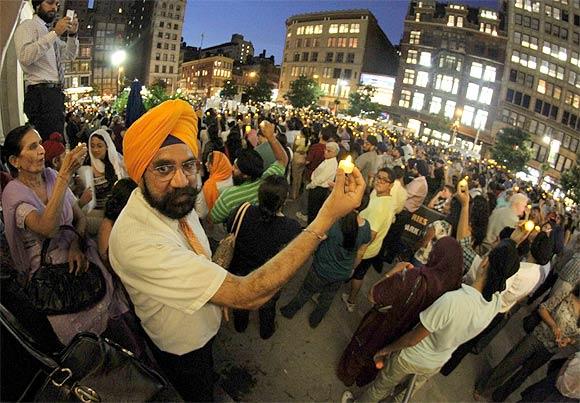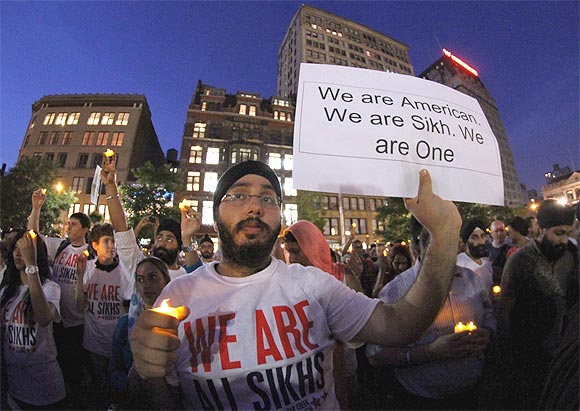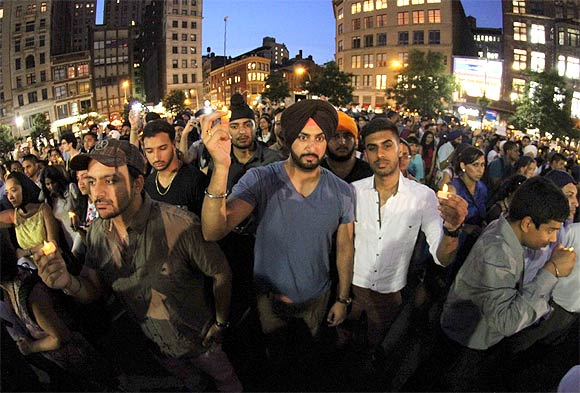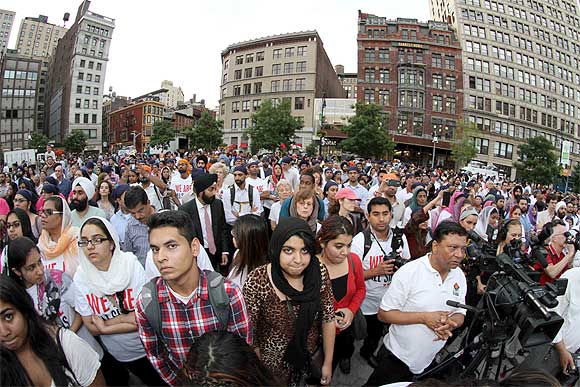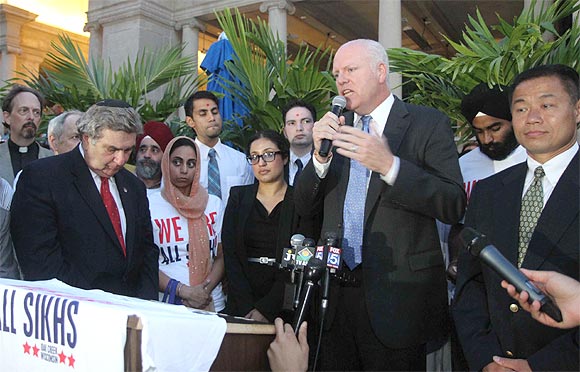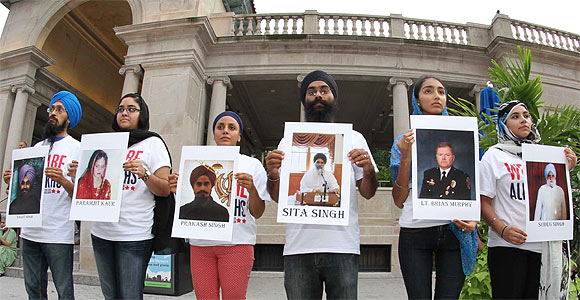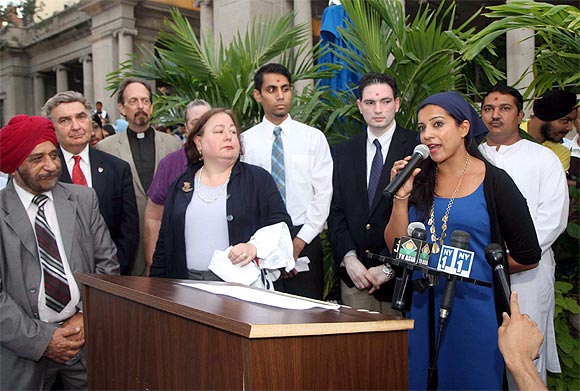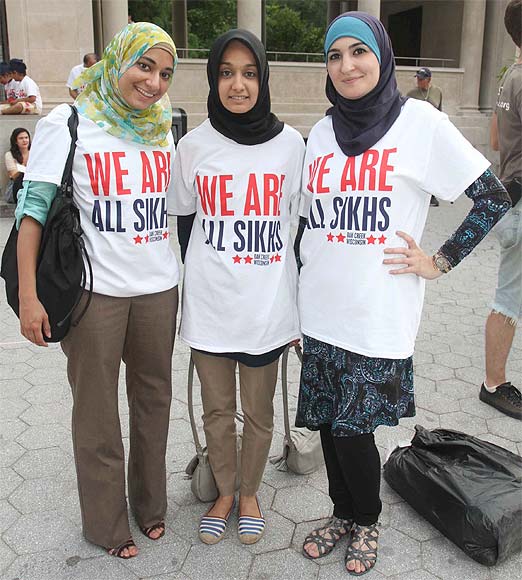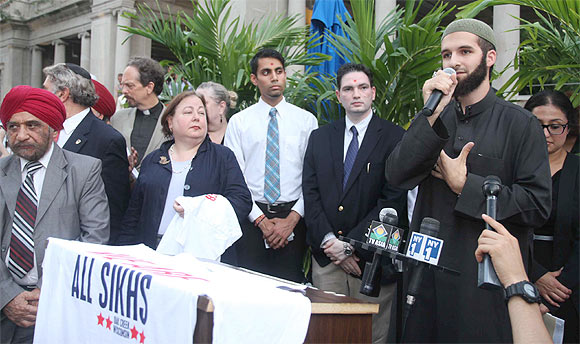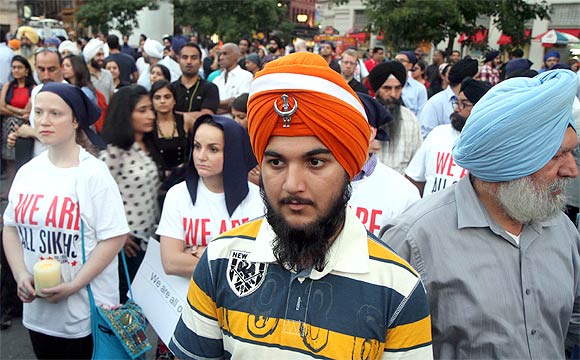 | « Back to article | Print this article |
PHOTOS: America weeps for Wisconsin gurdwara victims
Hundreds of people from various walks of life, Indian-Americans in particular, gathered in cities across the United States to mourn the killing of six Sikh worshippers at a Wisconsin gurdwara, describing the incident as an "ugly and dark day" in the US history.
Be it Manhattan in New York City, the Lafayette Square Park in front of the White House in Washington or places like Boston, Chicago and San Francisco, the mood was same everywhere, with people, including children and women, displaying pictures of the six worshippers shot dead by a lone gunman at the Oak Creek gurdwara on Sunday.
Click NEXT to read further...
America weeps for Wisconsin gurdwara victims
Observing August 8 as a National Day of Remembrance and Solidarity, they also prominently displayed the pictures of police officer Bryan Murphy, who received multiple gunshots wounds when ex-army veteran Wade Michael Page fired at him after he had indiscriminately shot and killed the six people at the Oak Creek gurdwara.
America weeps for Wisconsin gurdwara victims
People held up candles and wore T-shirts on which was written, "We are all Sikhs. Oak Creek Wisconsin." They carried banners and posters that read: "We are all one," "We are American, we are Sikh, we are one" and "Proud to be a Sikh."
They pledged that they would emerge much stronger than ever in the aftermath of this tragedy.
America weeps for Wisconsin gurdwara victims
Addressing the gatherings, eminent community members described the incident as an "ugly, dark day in the history of America."
Those participating in the vigil said no other community has been "hurt or targeted more" than the Sikhs in the aftermath of the 9/11 attacks in the US and the main reason behind such discrimination is ignorance.
America weeps for Wisconsin gurdwara victims
Addressing the community members at the vigil in Manhattan, US Congressman Joe Crowley said if people are attacked and killed in places of worship in the country, then this is not the America he has known.
Crowley said it is crucial that a conversation is started in the country that questions how weapons end up in the hands of criminals.
America weeps for Wisconsin gurdwara victims
"We have to talk about limiting access of weapons for criminal use. Those people who were shot and killed in the gurdwara and their families need to hear answers about how a mentally unstable person like Page had easy access to guns, which took the lives of others," he said.
"What happened to the Sikh community can happen to anyone of us."
America weeps for Wisconsin gurdwara victims
On Sunday "we saw the darkest side of mankind," said Dr Natasha Kaur, addressing the mourners near the White House.
Currently doing her residency at the George Washington University, she recollected how as an eight-year-old she along with her two brothers had the first encounter with hate crime.
"We must take the steps, each of us to say enough is enough," Sadiya Abjani from the 'South Asian Americans Leading Together' told the gathering in front of the White House.
America weeps for Wisconsin gurdwara victims
"All of us here tonight and vigils being held across the country are sending a message. Our collective voice sends out the message that as a nation we must denounce hate fueled sentiment ... that has become common place in our public and political discourse," she said.
America weeps for Wisconsin gurdwara victims
Over the next few days several candle light vigils are being planned across the country.
In Chicago, a large number of Sikhs and members of the Indian-American community gathered for the second consecutive day for candlelight and peace vigil.
America weeps for Wisconsin gurdwara victims
"As our nation still struggles to comprehend what happened and we continue to support the victims and their families it's important to send a clear and unified message to those who attempt to divide us with these senseless acts of violence," said Satjeet Kaur of the Sikh Coalition.
"We will not be divided, we will find hope in a moment of great tragedy, and we will move forward in the belief that freedom of religion remains a fundamental tenet of our great democracy," she said.
TOP photo features of the week
Click on MORE to see another set of PHOTO features...
